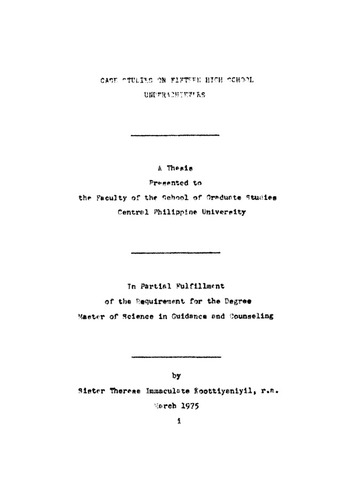Case studies on fifteen high school underachievers
| dc.contributor.adviser | Herradura, Elma S. | |
| dc.contributor.author | Koottiyaniyil, Therese Immaculate | |
| dc.date.accessioned | 2021-10-14T05:14:31Z | |
| dc.date.available | 2021-10-14T05:14:31Z | |
| dc.date.issued | 1975 | |
| dc.identifier.citation | Koottiyaniyil, T. I. (1975). Case studies on fifteen high school underachievers (Unpublished Master’s thesis). Central Philippine University, Jaro, Iloilo City. | en_US |
| dc.identifier.uri | https://hdl.handle.net/20.500.12852/1565 | |
| dc.description | Introduction and statement of the problem | en_US |
| dc.description.abstract | The problem of underachievement is a complex one and merits the attention of parents, teachers, administrators, and guidance-counselors. Much is being said and written nowadays about the conservation of our natural resources and man-power development. The Filipinos were talented, creative, and intelligent. This is especially true with the growing generation. Are not these human resources not to be considered richer and more valuable than the natural resources? Unfortunately, much of human energy is wasted through non-use or misuse. Waste of ability is a "loss to society". Young people whose scholastic performance lags far behind their intellectual ability represent a serious loss to society in terms of their potential contributions. Serious educational maladjustment is often due to the delay in discovering early enough the discrepancy between achievement and ability of the students. Many capable students do not realize that they possess outstanding ability and consequently do not have the ambition to utilize their capacity. Parents and teachers have a great responsibility in helping the underachievers to realize their potentialities and to bring out their maximum capacities. The problem of underachievement should be a matter of great concern to those who are engaged in the field of education since underachievement prevents the individual from fully realising his potentials. If an effective solution to this problem is found, both the underachieving individual and society will mutually benefit. In order to be able to solve the problem, one has to identify the cause of it. Many studies have been made, both in the Philippines and abroad, about the relationship of some non- intellective factors to the students' achievement. Many researchers have found out that study habits and attitudes, personality, and self-concept are positively related to academic achievement. Despite the considerable research devoted to this topic, there has been little advance in isolating the real causes of underachievement. The focus of this study is on the underachievers. In order to pursue the research to some depths, attention has been directed toward a limited number of cases. Through these case studies the researcher tried to identify the probable causes of underachievement. Statement of the Problem Through analyse of many measures and data about each Case, the researcher aimed to discover the following: 1. The (characteristic patterns of) personality traits of underachievers. 2. a. The problem areas, through the administration of the Mooney Problem Check List, and the specific problems in these areas that are mentioned by the majority of the Cases. b. The seriousness of underachievers' problems regarding "home and family". 3. Acceptance of the underachievers by their peers. 4. The adequacy of their self-concept. 5. The level of their academic motivation. 6. Their study habits and attitudes, and the specific problems in the SSHA that are common to the majority of underachievers. More specifically, the following research hypotheses were tested: Hypothesis 1. There are negative personality characteristics that are common to the majority of underachievers. Hypothesis 2-a. There are problems identified by the use of the Mooney Problem Check List, that are common to the majority of underachievers, Hypothesis 2-b. The area "home and family" is a serious problem area for the majority of underachievers. Hypothesis 3. The majority of underachievers are not "well-accepted" by their peers. Hypothesis 4. The majority of underachievers does not have adequate self-concept. Hypothesis 5. The majority of underachievers does not have high academic motivation. Hypothesis 6. The majority of underachievers does not have good study habits and attitudes. There are problems in these areas that are common to the majority of underachievers. | en_US |
| dc.format.extent | 333 leaves | en_US |
| dc.language.iso | en | en_US |
| dc.subject.ddc | GSL Theses 378.242 K837 | en_US |
| dc.subject.lcsh | High school students | en_US |
| dc.subject.lcsh | Underachievers | en_US |
| dc.subject.lcsh | High school students--Attitudes | en_US |
| dc.subject.lcsh | Underachievers--Social conditions | en_US |
| dc.subject.lcsh | Underachievers--Attitudes | en_US |
| dc.subject.lcsh | Case studies | en |
| dc.title | Case studies on fifteen high school underachievers | en_US |
| dc.type | Thesis | en_US |
| dc.description.bibliographicalreferences | Includes bibliographical references | en_US |
| dc.contributor.chair | Herradura, Elma S. | |
| dc.contributor.committeemember | Griño, Eliza U. | |
| dc.contributor.committeemember | Porter, Josefina Y. | |
| dc.contributor.department | School of Graduate Studies | en_US |
| dc.description.degree | Master of Science in Guidance and Counseling | en_US |
| local.relation.associatedcontent | https://repository.cpu.edu.ph/handle/20.500.12852/2155 Journal article published in Southeast Asia Journal | en |


